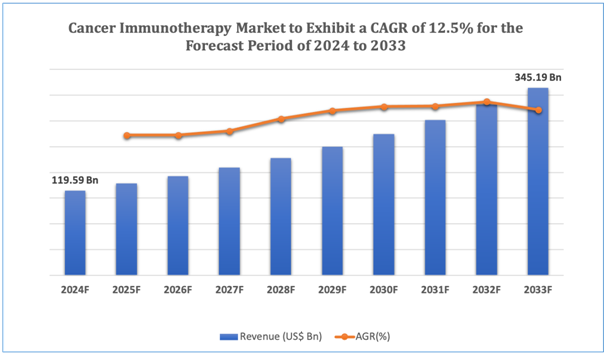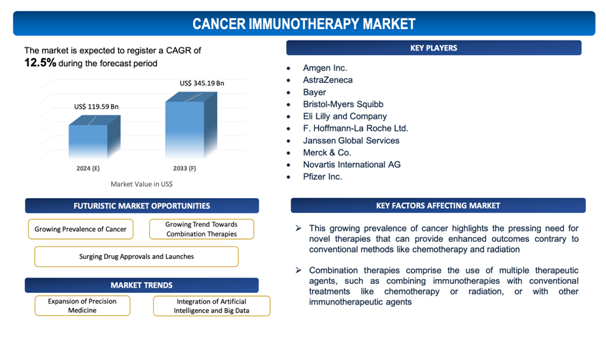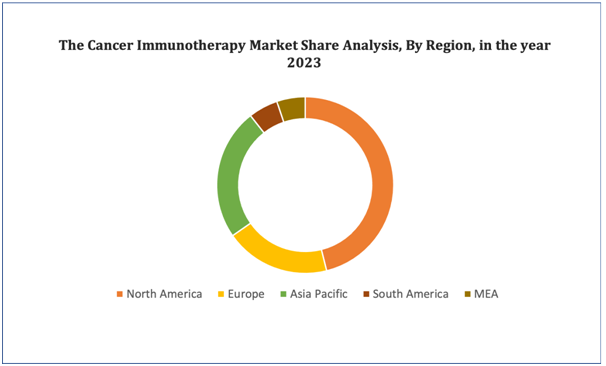Cancer Immunotherapy Market Overview
The global cancer immunotherapymarket is estimated to be worth over USD 345.19 Bnin 2033 and is expected to grow at CAGR of12.5% during the forecast period (2024-2033).
Cancer immunotherapy is an innovative method that harnesses the body's immune system to combat cancer, indicating a significantradical change in oncology.Conventional cancer treatments, such as chemotherapy and radiation, especially target cancer cells directly but often at the cost of serious damage to healthy tissues. Immunotherapy, regardless, harnesses and improves the innate capacity of the immune system to discern and eradicate cancer cells, offering a more targeted and often more benign approach.
One of the most revolutionary aspects of cancer immunotherapy is its potential for durable responses. Unlike traditional therapies that are likely to only work for a restricted time, immunotherapies can offer long-term remission by establishing an ongoing immune surveillance mechanism against cancer recurrence. This is particularly evident in treatments like checkpoint inhibitors, which block proteins such as PD-1 and CTLA-4 that cancer cells use to evade immune detection. By impeding these checkpoints, drugs like nivolumab and pembrolizumab reactivate T-cells to combat cancer cells more efficiently.
Another revolutionary development is CAR-T cell therapy, where a patient's T-cells are genetically modified to express chimeric antigen receptors (CARs) that specifically target cancer cells. This personalized treatment has indicatednoteworthy success, specifically in blood cancers like leukaemia and lymphoma, attaining high remission rates even in patients who have used up other treatment alternatives.
Cancer vaccines and oncolytic virus therapies further diversify the immunotherapy arsenal. Cancer vaccines focus on initiating a strong immune response against cancer-specific antigens, while oncolytic viruses particularly infect and kill cancer cells, concurrentlyencouraging an anti-tumour immune response.
The impact of immunotherapy extends beyond individual patient outcomes. It is transforming the clinical landscape by fostering precision medicine approaches, where treatments are tailored based on the genetic and immunological profile of both the patient and their tumour. This has paved its way to development of biomarkers that anticipate response to immunotherapy, allowing more personalized and effective treatment strategies.
Therefore, cancer immunotherapy is revolutionizing cancer treatment by providing promising future for long-term remission and survival, revolutionizing how cancer is treated and managed. Its capacity to harness the immune system exhibits a radical shift towards more effective, targeted, and sustainable cancer therapies, marking a newfound era in oncology.
Figure 1. Cancer Immunotherapy: Market Size

Get more details on this report - Request Free Sample
Key Market Insights
The global cancer immunotherapy market is witnessingswift growth, fuelled by surging cancer prevalence, developments in biotechnology, and soaring awareness of immunotherapy's potential. Significant developments comprise the approval and large-scale uptake of checkpoint inhibitors, such as pembrolizumab and nivolumab, which have transformed treatment for different cancers, comprising melanoma and non-small cell lung cancer. CAR-T cell therapies, like Kymriah and Yescarta, have demonstratedextraordinary success in treating hematologic malignancies, resulting inmassive investment in research and development.
Novel technologies are further defining the panorama. Personalized cancer vaccines and oncolytic virus therapies are evolving as promising treatments, improving the immune response against cancer-specific antigens and particularly targeting cancer cells, respectively. The use of advanced biomarkers and companion diagnostics is allowing more accurate and personalized treatment regimens, optimizing patient outcomes and mitigatingadverse effects.
The market is also experiencing strategic collaborations and acquisitions among pharmaceutical giants and biotech firms, focused at diversifying immunotherapy portfolios and stimulating innovation. North America currently dominates the market, owing to robust healthcare infrastructure, significant R&D investment, and favorable regulatory policies. However, Asia-Pacific is expected to witness the fastest growth attributing to growing healthcare expenditure, enhancing healthcare facilities, and anincreasing patient population.Overall, the global cancer immunotherapy market is poised for revolutionary growth, with novel therapies and technological breakthroughsleading the way for more effective and personalized cancer treatments.
Market Dynamics
Market Drivers
Growing Prevalence of Cancer
Since cancer incidence rates continue to riseacross the world, the demand for innovative and effective treatments intensifies. This growing prevalence highlights the pressing need for novel therapies that can provideenhanced outcomes contrary to conventional methods like chemotherapy and radiation. Immunotherapy, which leverages the body’s immune system to target and fight cancer cells, has evolved as a cutting-edge approach in this context.Cancer's intensifying burden, indicated in both newly diagnosed cases and cancer-associated deaths, accelerates the healthcare industry to seek advanced treatments that not only lengthen survival but also improve the quality of life for patients.
Immunotherapies, such as checkpoint inhibitors and CAR-T cell therapies, are in the lead of these developments, demonstratingnoteworthyefficiency in treating different cancer types, comprising those resistant to traditional therapies. The increasing awareness and acceptance of immunotherapy among healthcare providers and patients further propel its market growth.
In addition, as more cancers are diagnosed, there is an escalated focus on precision medicine and personalized treatment plans, where immunotherapy holds a critical role. Pharmaceutical companies and biotech firms are addressing to this demand by investing heavily in research and development, resultingin a rise in clinical trials and the introduction of new immunotherapeutic agents. Governments and healthcare organizations are also facilitating these efforts through favorable policies and funding, determining the potential of immunotherapy to address the global cancer crisis.
Thus, the rising prevalence of cancer substantiallyaccelerates the global immunotherapy market by creating a crucial demand for more effective, targeted, and innovative treatment alternatives.
Market Restraints
With regard to numerous advantages of cancer immunotherapy, the market faces several challenges due to the unique characteristics and requirements associated with these potent pharmaceutical products. Some of the key market challenges include:
- High Treatment Costs: Treatments such as checkpoint inhibitors and CAR-T cell therapies are increasingly specialized and costly, often reaching hundreds of thousands of dollars per patient. This high cost can deter accessibility for many patients, particularly in low- and middle-income countries, and stands as a financial strain even in wealthier nations. Insurance coverage and reimbursement issues further aggravate this challenge, impeding widespread adoption of these advanced therapies.
- Complexity of Development and Regulatory Approval: The development and approval process for cancer immunotherapies is complex and time-consuming. These therapies need rigorous clinical trials to demonstrate safety and efficacy, which can take several years and substantial financial investment. In addition, the regulatory panorama for immunotherapies is stringent, with varying requirements across different regions. Navigating these regulations can be arduous for pharmaceutical companies, potentially delaying the introduction of new treatments to the market. This complication can slow down innovation and limit the availability of new immunotherapy alternatives for patients.

Get more details on this report - Request Free Sample
Market Opportunity
Growing Trend Towards Combination Therapies
Combination therapies comprise the use of multiple therapeutic agents, such as combining immunotherapies with conventional treatments like chemotherapy or radiation, or with other immunotherapeutic agents. This approach focuses onimproving treatment efficiency, conquer resistance, and enhance patient outcomes. By leveraging the compound effects of various mechanisms of action, combination therapies can target cancer cells more extensively and minimize the likelihood of relapse.
This trend is accelerated by continuous research and clinical trials illustrating the potential benefits of combination regimens. For instance, the pairing of checkpoint inhibitors with targeted therapies or other immune-modulating agents has demonstrated promising results in treating different cancer types, comprising those that are conventionallycomplex to treat. Such combinations can help modulate the tumour microenvironment, making it more vulnerable to immune attack and improving the overall therapeutic response.
The market opportunity is further magnified by the personalized medicine approach, where combination therapies can be customized to the individual patient’s genetic and molecular profile, optimizing treatment effectiveness. As a result, the trend towards combination therapies not only opens new prospects for innovation but also fuels market growth by providing more effective and comprehensive treatment alternatives for cancer patients.
Market Trends
- Expansion of Precision Medicine: Precision medicine endures to expand within the cancer immunotherapy market, emphasizing on personalizing treatments to individual patients on the basis of their genetic and molecular profiles. This trend is fuelled by developments in genomic sequencing and molecular diagnostics, which enable for the identification of specific mutations and immune signatures that can forecast response to immunotherapy. As a result, treatments are becoming more personalized, with therapies designed to target the unique characteristics of each patient's cancer. This approach not only enhances treatment efficiency and minimizes side effects but also fosters the development of combination therapies that are tailored to the specific needs of patients, thusimproving overall outcomes and accelerating market growth.
- Integration of Artificial Intelligence and Big Data: The incorporation of artificial intelligence (AI) and big data analytics into cancer immunotherapy is a notable market trend. AI and machine learning algorithms are being utilized to assess vast amounts of genomic, proteomic, and clinical data to determine new biomarkers and predict patient responses to immunotherapy. This technological progressionallows the development of more personalized treatment plans, improves the efficacy of drug discovery, and optimizes clinical trial designs. By leveraging AI, researchers can reveal novel insights into the mechanisms of cancer and the immune system, resulting in the creation of more effective and targeted immunotherapeutic agents.
Cancer Immunotherapy Market: Key Segments
By Type
- Monoclonal Antibodies
- Cancer Vaccines
- Checkpoint Inhibitors
- Immunomodulators
By Application
- Lung Cancer
- Breast Cancer
- Head & Neck Cancer
- Prostate Cancer
- Colorectal Cancer
- Melanoma
- Others
By End User
- Hospitals
- Clinics & Others
By Key Geographical Regions
- North America
- Europe
- Asia-Pacific
- Middle East and Africa
- South America
Figure 4. Cancer Immunotherapy Market: Distribution by Region

Get more details on this report - Request Free Sample
Cancer Immunotherapy Market: Regional Analysis
U.S. is estimated to dominate in North America owing to presence of major pharmaceutical companies, research centres, academic institutions and availability of venture capital, private investment, and a deep-rooted financial system. Germany is anticipated to dominate the market owing to its first-class biopharmaceutical sector, strong research and innovation, robust emphasis on academic-industry collaborations, effective regulatory environment, substantial investment in R&D, and stringent intellectual property protection. China is estimated to dominate the market attributing to its government support for innovation, a large and diverse patient population, strategic international collaborations, enhancing regulatory environment, and a focus on developing cost-effective therapies.
Leading Cancer Immunotherapy Developers
Industry Trends and Global Forecasts, 2023-2035 report features an extensive study of the current market landscape, market size and future opportunities associated with the cancer immunotherapymarket, during the given forecast period. Further, the market report highlights the efforts of several stakeholders engaged in this rapidly emerging segment of the biopharmaceutical industry. Key takeaways of the Cancer Immunotherapymarket are briefly discussed below.
The report includes the list of players operating in the global Cancer Immunotherapy market. Some of the key players include:
- Amgen Inc.
- AstraZeneca
- Bayer
- Bristol-Myers Squibb
- Eli Lilly and Company
- F. Hoffmann-La Roche Ltd.
- Janssen Global Services
- Merck & Co.
- Novartis International AG
- Pfizer Inc.
Cancer Immunotherapy Market: Key Developments
- In April 2024, ImmunityBio, Inc., an immunotherapy company, announced that the U.S. Food and Drug Administration (FDA) has approved ANKTIVA (N-803, or nogapendekin alfa inbakicept-pmln) plus Bacillus Calmette-Guérin (BCG) for the treatment of patients with BCG-unresponsive non-muscle invasive bladder cancer (NMIBC) with carcinoma in situ (CIS), with or without papillary tumours.
- In December 2023, Pfizer Inc., announced the successful completion of its acquisition of Seagen Inc., a global biotechnology company that discovers, develops and commercializes transformative cancer medicines.
Scope of the Report
The market report presents an in-depth analysis of the various firms / organizations that are engaged in this market, across different segments, as defined in the below table:
|
|
Key Report Attributes |
Details |
||
|
|
Base Year |
2023 |
||
|
|
Forecast Period |
2024-2033 |
||
|
|
CAGR (2024-2033) |
12.5% |
||
|
|
Type |
|
||
|
|
Application |
|
||
|
|
End User |
|
||
|
|
Key Geographical Regions |
|
||
|
Key Companies Profiled |
|
|
||
